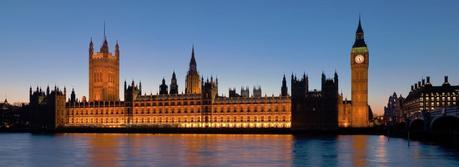
The Palace of Westminster at night as seen from the opposite side of the River Thames. (Photo by DAVID ILIFF. License: CC-BY-SA 3.0)
In a recently published physics paper called “Hot Air in the House of Commons” researchers from the University of Leicester have shown that the parliamentary debates are not, in fact, a useless waste of breath—MPs debating in the Commons produce 10.34 kW of power.
But according to University of Leicester physics students, the hot air produced by 650 MPs debating in the Commons actually releases up to 10.34 kilowatts of power.
This is the same as about 1000 energy saving light bulbs or 200 old fashioned light bulbs.
The group of fourth year MPhys students published the findings in a paper entitled Hot Air in the House of Commons in this year’s University of Leicester’s Journal of Physics Special Topics.
The journal is published every year, and features original short papers written by students in the final year of their four-year Master of Physics degree at the University’s Department of Physics and Astronomy.
The students are encouraged to be imaginative with their topics, and the aim is for them to learn about aspects of publishing and peer review.
The students calculated the power generated from heat flow as MPs breathe in air, heat the air to body temperature in their lungs before breathing out the air back into the room.
They took into account the heat capacity and density of air as well as average volume flow rates during prolonged talking – and found that 2.54 kW would be generated by the 650 MPs.
They also calculated the power output created as water vapour from the MPs’ exhaled breath condenses into liquid.
They found this would add a further 7.8kW for 650 MPs, bringing the total output to10.34 kW.
The paper was written by final year MPhys students Daniel Staab, 23, Emily Jane Watkinson, 22, Maria-Theresia Walach, 22, and Zach Rogerson, 22.
They stressed their findings were based on the assumptions that all MPs are present and talking continuously – and that there is equal hot air production regardless of party affiliation.
Student Daniel Staab, from Germany, co author of the paper, said: “We assumed the hot air output is the same for members of all parties and will stay the same in the future, regardless of who wins the next elections.”
They also found the chamber’s historic construction does not capture the heat generated by the MPs, and so most of it is lost through the roof.
In a subsequent paper, Heat Loss in the House of Commons, the students examined whether the heat from the MPs could be used as an alternative method of heating the Commons chamber.
Emily Jane Watkinson, from Weldon, Northamptonshire, co-author, said: “Unfortunately, to keep the temperature in the chamber at a pleasant 20˚C, you would have to turn the heating on as soon as the outside drops below 19.8˚C. So it isn’t much use with our weather.”
The students added that new insulation installed as part of the general renovation of Westminster Palace could make the MPs heat output more useful – and reduce the energy bills of future Parliaments.
Course leader Dr Mervyn Roy, a lecturer at the University’s Department of Physics and Astronomy, said: “A lot of the papers published in the Journal are on subjects that are amusing, topical, or a bit off-the-wall. Our fourth years are nothing if not creative!
“But, to be a research physicist – in industry or academia – you need to show some imagination, to think outside the box, and this is certainly something that the module allows our students to practice.
“Most of our masters students hope to go on to careers in research where a lot of their time will be taken up with scientific publishing – writing and submitting papers, and writing and responding to referee reports.
“This is another area where the module really helps. Because Physics Special Topics is run exactly like a professional journal, the students get the chance to develop all the skills they will need when dealing with high profile journals like Nature or Science later on in life.”
You can read the full papers here.

